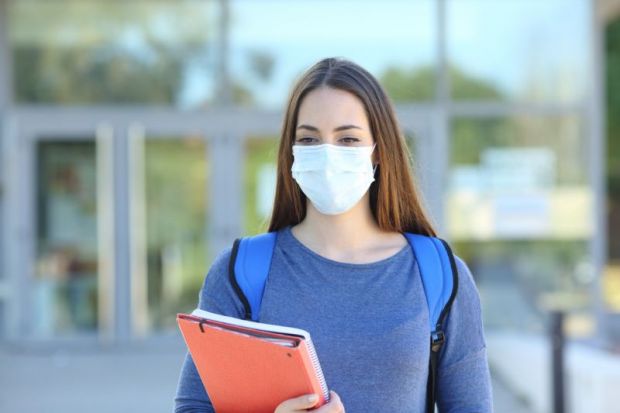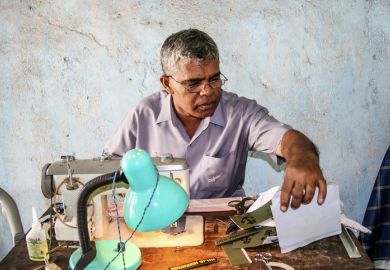Growing numbers of UK universities are extending their teaching hours into evenings and weekends to accommodate the smaller class sizes demanded by social distancing guidelines, according to Times Higher Education research, which has triggered fresh concern over lecturers’ physical and mental well-being when term gets under way.
The THE survey, which compiled Covid-19 safety rules from scores of campuses, also confirms that the majority of institutions will require the wearing of face masks in at least some areas, often during teaching, and that some universities are providing transparent face visors for lecturers.
However, some academics remain uneasy about returning to face-to-face teaching, and the University and College Union has raised concerns about the additional burden that evening and weekend classes would place on staff. “It’s reckless to be rushing back,” said Jo Grady, the union’s general secretary.
The survey, which 69 universities responded to, confirms that most UK universities plan to conduct their large lectures online next term but hope to do as much face-to-face teaching as they can in smaller groups such as seminars and tutorials.
However, universities are being forced to restrict group sizes to ensure that social distancing can be maintained, and this means that institutions are having to increase the number of teaching sessions. Growing numbers are extending their working hours to accommodate this: of those that responded to the survey, 16 said they had already made the decision to extend normal hours, while 16 said they were still considering whether they would need to, and a large proportion did not answer this specific question.
The University of Bristol said teaching until 8pm on some weekday evenings would allow the institution to “spread out teaching…so we can offer more in-person teaching and greater access to our specialist facilities in line with social distancing guidelines”.
The University of Central Lancashire, Coventry University and the University of the Arts London were among the providers to say they would now provide teaching on a Saturday.
Others said they were waiting on further government guidance, with the University of Dundee opting to push the coming term’s start date back by three weeks to October. “We were waiting to see if there would be further guidance on whether social distancing would be on a one-metre or two-metre basis, as the difference between the two is considerable in terms of impact on what spaces can be used and how they need to be configured,” a spokesman said.
Graham Virgo, senior pro vice-chancellor for education at the University of Cambridge, said his institution planned to conduct small group teaching by repurposing large lecture theatres. “The trouble is access: we can’t have students all crowding out through one door into the corridor. These are the things we are constantly thinking about to make sure it is as safe as possible to return. We are undertaking risk assessments on any teaching space,” he said.
Professor Virgo said Cambridge was not currently planning to expand teaching hours, but if it were to, it would do so only “if it works for everyone. Staff have their own commitments; we have to be as flexible as possible.”
Of the 69 institutions that responded to the THE survey, 53 said they would require staff and students to wear face coverings in communal areas on campus unless they had a medical reason not to.
Twenty-four institutions said staff and students would have to wear face coverings during teaching. A number of institutions, including the universities of Leeds, Bolton and Northampton, said they would be providing clear visors for lecturers to wear in response to concerns that not being able to see an academic’s face properly can make it harder for students, particularly those with hearing difficulties.
Bolton has gone a step further and installed large Perspex screens to separate lecturers and students.
Dr Grady said universities had gone too far in “bending over backwards to promise students in-person teaching next year” and questioned whether extending teaching hours was a good solution.
“Universities constantly talk about staff and student safety as a top priority, [but] we need to see some action that demonstrates that. There is the obvious and more apparent risk of infection rates, but there is the real health and safety risk of burnout, stress and bad mental well-being, especially when [lecturers’] fixed-term colleagues have been axed,” she said.
“There has been unprecedented goodwill among the sector to teach online, [and] to prepare for next year, but it will only last so long. There has been a complete lack of responsibility [by universities] to engage meaningfully with their staff about the adaptations that need to occur.”
A Universities UK spokesman said safety measures were “based on the current risk level, drawing upon official guidance and the significant expertise that already exists in universities, and the views of staff and students”.
“As well as practical measures, including enhanced cleaning and ventilation, social distancing techniques such as managing the flow of students, and using safety partitions and masks, universities are reducing in-person group sizes to minimise potential interactions and exposure to the virus. Flexible timetabling including evening teaching sessions may be a common approach,” the spokesman said.
“Recognising how hard staff have been working through the lockdown and into recovery, universities are having constructive conversations with sector trade unions to keep students and staff safe and to optimise learning, research and support.”
anna.mckie@timeshighereducation.com
Times Higher Education is partnering with the Independent Sage group of scientists for an online discussion on the safety of reopening university campuses. The event, at 1.30pm on 21 August, will be streamed on Independent Sage’s Twitter and YouTube channels.
POSTSCRIPT:
Print headline: Smaller class sizes push teaching into nights and weekends
Register to continue
Why register?
- Registration is free and only takes a moment
- Once registered, you can read 3 articles a month
- Sign up for our newsletter
Subscribe
Or subscribe for unlimited access to:
- Unlimited access to news, views, insights & reviews
- Digital editions
- Digital access to THE’s university and college rankings analysis
Already registered or a current subscriber? Login








